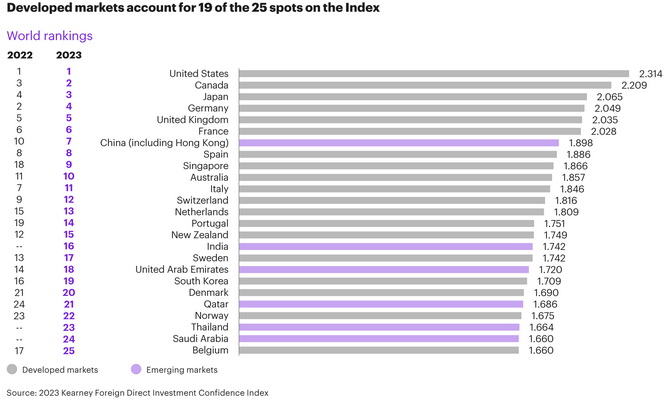The United States remained in the first position among the economies that will attract the most Foreign Direct Investment (FDI) in the world in the next three years, according to Kearney Consulting.
This was followed by Canada, Japan, Germany and the United Kingdom.
Since its inception in 1998, the countries ranked in the FDI Confidence Index have remained very close to the top destinations for real FDI flows in the following years.

So, at the macro level, the FDI Confidence Index is a relatively reasonable predictor of where FDI flows will go over the next three years.
However, investor intentions may change due to economic or political developments in potential host markets, the availability of quality targets and projects in the potential host market, or other reasons.
In addition, the FDI Confidence Index is not an apples-to-apples comparison of FDI flows because the units of analysis are different.
The FDI Confidence Index measures firms’ planned investments in a market, but not the size of those investments.
FDI flows are generally reported in U.S. dollars, so a large investment by one firm may outweigh smaller investments by many firms.
Economies that will attract the most Foreign Direct Investment
For the second year in a row, the three factors investors prioritize when choosing where to make their FDI are transparency of government regulations, technological and innovation capacity, and tax rates and ease of paying taxes.
For European and American investors, the main reason for choosing where to make FDI is the transparency of government regulations and the absence of corruption.
This probably reflects the European Union‘s focus on regulatory compliance, whether in terms of data transfer through GDPR legislation or best business practices.
On the other hand, Asian investors value tax rates and ease of payment the most when choosing where to do their FDI.
Kearney also asked investors for their reasons for choosing not to invest in a certain type of market: developed, emerging or frontier.
The results were very mixed. The availability (or, presumably, lack thereof) of raw materials and other inputs was the top reason (40%) for not considering investing in developed markets.
Political instability (38%) is by far the top reason investors do not consider investing in emerging markets.
Finally, investors cited infrastructure quality (36 percent) as the main factor blocking their investments in frontier markets.

